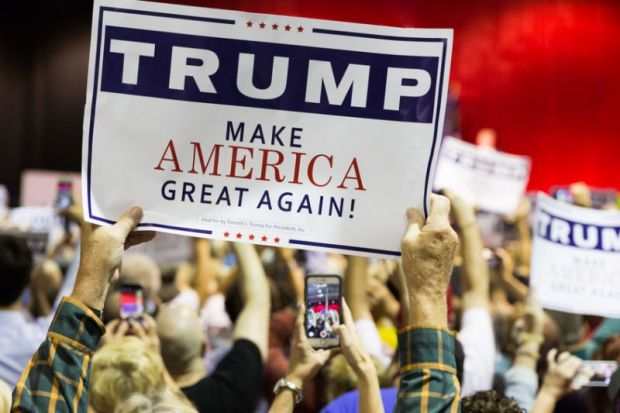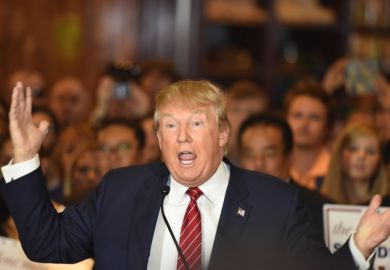Yesterday afternoon I wrote two articles for the Times Higher Education website. Short, holding articles to sit on the homepage once the result of the US presidential election was known, meaning that anyone visiting our site didn't think we'd missed the biggest news of the day.
One began: “Hillary Clinton has been all but confirmed as the 45th president of the US, but what does her election mean for higher education?”
The other – now published (and since updated multiple times, as you might expect) – substituted the words “Hillary Clinton” for two words now sending shock-waves through university campuses the world over: Donald Trump.
We know now that the 45th president of the United States will be a Republican. A reality TV star. A billionaire businessman who managed to defy the polls to claim a historic victory in one of the most divisive US election battles ever.
But what of that question I mentioned above. What does the election of Trump mean for higher education in the US? When I tweeted this question from the THE account, one person replied simply: “It means it has failed”.
One thing I can tell you is that my never-to-be-published article about a Hillary Clinton victory was considerably longer than the Trump one. It had considerably more detail. It had actual policies, and reaction to her plans from people in the sector.
As for Trump? Not so much.
As Scott Jaschik, editor of Inside Higher Ed, writes in this excellent analysis: “Nobody really knows what a Trump administration will be like, given how unorthodox his campaign was, his desire to shake up Washington, his lack of policy details and deep fissures between the president-elect and congressional leaders on both sides of the aisle.”
We do, however, know one thing: it will be interesting.
There are some clues. In October, Mr Trump dedicated about 10 minutes of a speech in Ohio to higher education. He says he wants to end tax-exempt status for colleges that do not use their large endowments to reduce the cost of tuition.
“If colleges refuse to take this responsibility seriously, they will be held accountable,” he said.
He has called for income-based student loan repayment, saying that graduates (or drop-outs, presumably) should “not be asked to pay more on loans than they can afford”. Repayments, he believes, should be capped at 12.5 per cent of borrowers' income.
Sam Clovis, who was policy director of Trump’s election campaign (and a tenured professor of economics at Morningside College), has also spoken of Trump’s plans to somehow guarantee free speech on campus (I say “somehow”, because there has been little detail on this), and to reject any state-federal partnership to make community college free for high-school leavers.
As for Trump's much-publicised temporary ban on all Muslims entering the US, Clovis has previously said that this policy would apply to Muslim international students.
Although he did appear to row back from this position in more recent comments, an ideological test for admission to the US and the temporary suspension of visa processing from countries “that have a history of exporting terrorism” has been discussed – and this could certainly hit student and staff recruitment. That is a very big deal for a sector that is able to charge large tuition fees to overseas students because of its international reputation.
Policy detail, however, is thin on the ground. It will arguably be Trump’s rhetoric about academia that will most worry those in our universities.
He has made reference to “tremendous bloat” within US higher education, suggesting that he believes there are significant administration savings to be made by universities and colleges. He has criticised institutions for being too politically correct, and openly questions climate change – something that the vast majority of academics find mind-boggling.
As we speak, many students on campuses in the US are protesting; many are celebrating. This is an election that has divided a nation, and so it is on university campuses.
The next four years will be huge.
Chris Parr is digital and communities editor at Times Higher Education. This article was originally published on LinkedIn.
Register to continue
Why register?
- Registration is free and only takes a moment
- Once registered, you can read 3 articles a month
- Sign up for our newsletter
Subscribe
Or subscribe for unlimited access to:
- Unlimited access to news, views, insights & reviews
- Digital editions
- Digital access to THE’s university and college rankings analysis
Already registered or a current subscriber?





